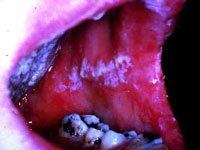An oral yeast infection, also called thrush or candidiasis, can be very painful. It is similar to vaginal yeast infections, being caused by the same organism.
Oral yeast infection is caused when the bacteria that live in your mouth get out of balance. You have a number of species living in your mouth at all times. One normal mouth resident is the yeast, Candida Albicans. It is balanced out by many other species of bacteria which compete with it for space and nutrients.
Causes of Oral Yeast Infection
But the bacteria in your mouth can get out of balance from any of several reasons:
- Infants, who do not yet have the full spectrum of bacterial population in their mouths, are susceptible to this.
- When people are poorly nourished, lacking in some essential nutrients in their diet, they can be susceptible to oral yeast infection.
- With people who wear dentures and never take them out, the environment in their mouths in changed enough that the growth of the yeast can be fostered under the denture.
- People with AIDS, where their immune system is compromised, are also susceptible to this.
- Sometimes a gum infection can be treated with oral rinses of hydrogen peroxide. While this kills many bacteria, if it is used for more than a two-week period, it can cause enough of an imbalance in your mouth that the yeast will begin to take over.
You cannot catch this oral yeast infection from someone else. It isn’t contagious at all. The Candida Albicans that causes it grows in everyone’s mouth, and it only causes a problem when the bacteriological balance in your mouth is disrupted.
Here is a photograph of an oral yeast infection. Notice the white patch on the inside of the cheek. These white patches can also be seen on the sides of the tongue. The way to tell that this is a yeast infection and not some other disease is to try to rub off the white patch. If it comes off, revealing red, inflamed tissue underneath, then it is a yeast infection.
Treatment of Oral Yeast Infection
Treatment involves taking an anti-fungal agent, such as Nystatin, until it resolves. But the cause also needs to be addressed so that it doesn’t recur, so recommendations will be given for better nutrition, or other measures that will change the oral environment.
—Dr. David Hall.

